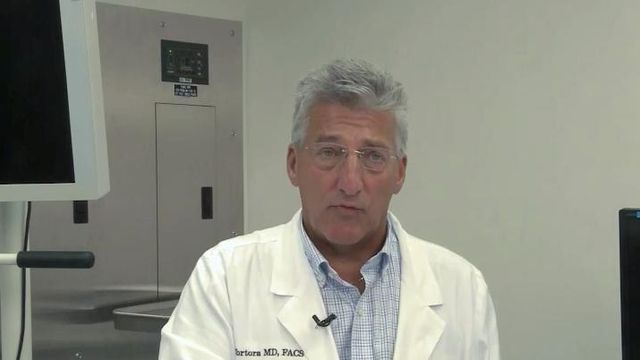Recently approved procedure uses sound waves to treat prostate tumors
Prostate cancer is the second leading cause of cancer-related death in men. Early detection through recommended screenings provides more treatment options for those affected, and now a minimally invasive procedure is available in the U.S. that promises a lower risk of side effects that other commonly used treatments.
Posted — UpdatedProstate cancer is the second leading cause of cancer-related death in men.
Early detection through recommended screenings provides more treatment options for those affected, and now a minimally invasive procedure is available in the U.S. that promises a lower risk of side effects that other commonly used treatments.
Glenn Seymour, 72, first met urologist Frank Tortora in 2011, a year after his diagnosis of prostate cancer. He chose to have frequent checks of PSA blood levels to see if the cancer may be an aggressive form.
"I went through a waiting period, and after about six months, my PSA went from 4.3 to 6.8, Seymour said.
Seymour said he feared the potential side effects of having surgery, which include incontinence or impotence. Radiation treatment can damage the rectum or bladder.
"The probe that's placed in the rectum produces a beam that focuses on a small area," Tortora said of the device.
Those small areas are each about the size of a grain of rice.
The probe raises the temperature of those area to more than 200 degrees, destroying tissue and starving cancerous tumors.
The U.S. Food and Drug Administration only recently cleared HIFU for use in the U.S., but in 2011, Seymour went to Cancun, Mexico, to get treated by Tortora.
Seymour said he was up and walking within hours of the procedure.
Now, Tortora is offering the HIFU procedure at Rex Surgical Center in Cary. He says the procedure offers patients more flexibility.
"You can treat multiple times. You can also do surgery if there's a recurrence, or you could do radiation if there's a recurrence," he said.
Seymour says he hopes he's done with treatment.
"My PSA's remain basically nonexistent and I'm cancer free today, thanks to HIFU," Seymour said.
About 15,000 patients worldwide have been treated with HIFU. Right now, however, private insurers don't cover the procedure, which has an average cost of about $25,000.
• Credits
Copyright 2024 by Capitol Broadcasting Company. All rights reserved. This material may not be published, broadcast, rewritten or redistributed.





